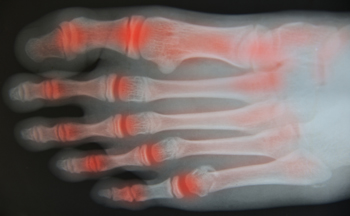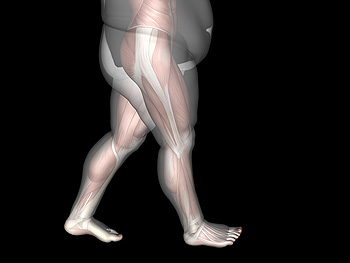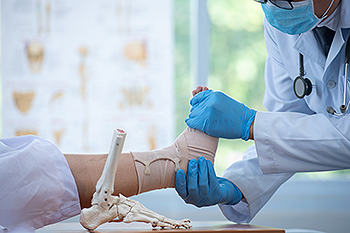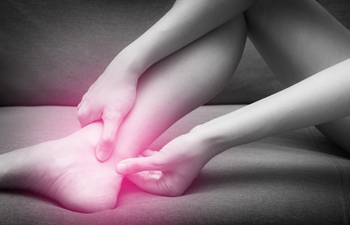Items filtered by date: September 2023
Assistive Devices for Foot or Ankle Arthritis

Assistive devices can be invaluable allies in the daily life of someone living with foot or ankle arthritis. These tools reduce joint stress, making activities more enjoyable and less tiring. For example, grab bars and bath seats can enhance safety and stability in the bathroom. Walking aids like canes should be used properly at the correct height. Podiatrists can recommend suitable assistive devices tailored to specific arthritis needs, helping maintain independence and complete daily activities. These devices are increasingly user-friendly and mainstream, making them accessible to all. If you have foot or ankle arthritis and would like to know more about devices that can make living your life easier, it is suggested that you make an appointment with a podiatrist who is well-versed in this area.
Arthritis can be a difficult condition to live with. If you are seeking treatment, contact Dr. John Branwell from Kearny, New Jersey. Our doctor can provide the care you need to keep you pain-free and on your feet.
Arthritic Foot Care
Arthritis is a term that is commonly used to describe joint pain. The condition itself can occur to anyone of any age, race, or gender, and there are over 100 types of it. Nevertheless, arthritis is more commonly found in women compared to men, and it is also more prevalent in those who are overweight. The causes of arthritis vary depending on which type of arthritis you have. Osteoarthritis for example, is often caused by injury, while rheumatoid arthritis is caused by a misdirected immune system.
Symptoms
- Swelling
- Pain
- Stiffness
- Decreased Range of Motion
Arthritic symptoms range in severity, and they may come and go. Some symptoms stay the same for several years but could potentially get worse with time. Severe cases of arthritis can prevent its sufferers from performing daily activities and make walking difficult.
Risk Factors
- Occupation – Occupations requiring repetitive knee movements have been linked to osteoarthritis
- Obesity – Excess weight can contribute to osteoarthritis development
- Infection – Microbial agents can infect the joints and trigger arthritis
- Joint Injuries – Damage to joints may lead to osteoarthritis
- Age – Risk increases with age
- Gender –Most types are more common in women
- Genetics – Arthritis can be hereditary
If you suspect your arthritis is affecting your feet, it is crucial that you see a podiatrist immediately. Your doctor will be able to address your specific case and help you decide which treatment method is best for you.
If you have any questions, please feel free to contact our office located in Kearny, NJ . We offer the newest diagnostic and treatment technologies for all your foot care needs.
Heel Pain and Obesity

Heel pain is a common complaint that can affect anyone, but it can be particularly challenging for those who are obese. The excess weight places additional stress on the feet, especially the heels, which bear the brunt of the load. This extra pressure can lead to various painful conditions, including plantar fasciitis, heel spurs, and Achilles tendonitis. Plantar fasciitis, in particular, is a frequent cause of heel pain. The plantar fascia, a thick band of tissue that runs along the bottom of the foot, can become strained and inflamed due to the increased weight. Fortunately, there are ways to manage and alleviate heel pain in obese individuals. Weight loss can significantly reduce the pressure on the feet and the pain. Wearing supportive footwear, custom orthotics, and stretching exercises may also help relieve discomfort. It is essential for those struggling with obesity to address their heel pain, as it can hinder mobility and overall well-being. Seeking help from a podiatrist is a crucial step toward finding relief and improving foot health. If you have heel pain and are overweight, it is suggested that you speak with this type of healthcare professional who can help you manage both conditions.
Obesity has become very problematic at this point in time and can have extremely negative effects on the feet. If you’re an obese individual and are concerned about your feet, contact Dr. John Branwell from Kearny, New Jersey. Our doctor can provide the care you need to keep you pain-free and on your feet.
Obesity and Your Feet
Since your feet are what support your entire weight when standing, any additional weight can result in pain and swelling. Being overweight is one of the main contributors to foot complications.
Problems & Complications
Extra Weight – Even putting on just a few extra pounds could create serious complications for your feet. As your weight increases, your balance and body will shift, creating new stresses on your feet. This uneven weight distribution can cause pain, even while doing the simplest tasks, such as walking.
Diabetes – People who are overweight are at serious risk of developing type-2 diabetes, which has a drastic impact on the health of your feet. As you get older, your diabetes might worsen, which could lead to loss of feeling in your feet, sores, and bruises. You could also become more prone to various infections.
Plantar fasciitis – Pressure and stress that is placed on muscles, joints, and tendons can trigger plantar fasciitis, which is an inflammation of tissue that forms along the bottom of the foot.
If you have any questions please feel free to contact our office located in Kearny, NJ . We offer the newest diagnostic and treatment technologies for all your foot and ankle needs.
Gout Pain Can Be Managed
Treatment and Recovery for Broken Ankles

Dealing with a broken ankle can be both painful and challenging. The first step is to seek medical attention for diagnosis through an X-ray. The treatment approach will depend on the severity of the fracture. Treatment options include using a specialized boot or a plaster cast to stabilize the ankle, possible bone manipulation under anesthesia, or even surgical intervention. Regular follow-up appointments are essential to monitor healing progress. Once diagnosed and treated, the recovery process begins. Healing typically takes 6 to 8 weeks or longer, depending on the severity of the break. Specific post-treatment instructions include how long the boot or cast will be needed and guidelines for weight-bearing. Gradual ankle movement and prescribed exercises may be recommended to prevent stiffness. Other recovery tips include resting and elevating the ankle, taking prescribed pain relievers, and being cautious about weight bearing. Gently moving your toes and bending your knee to prevent muscle stiffness is thought to be helpful. For help in dealing with a fractured ankle, it is suggested that you make an appointment with a podiatrist.
Broken ankles need immediate treatment. If you are seeking treatment, contact Dr. John Branwell from Kearny, New Jersey. Our doctor can provide the care you need to keep you pain-free and on your feet.
Broken Ankles
A broken ankle is experienced when a person fractures their tibia or fibula in the lower leg and ankle area. Both of these bones are attached at the bottom of the leg and combine to form what we know to be our ankle.
When a physician is referring to a break of the ankle, he or she is usually referring to a break in the area where the tibia and fibula are joined to create our ankle joint. Ankles are more prone to fractures because the ankle is an area that suffers a lot of pressure and stress. There are some obvious signs when a person experiences a fractured ankle, and the following symptoms may be present.
Symptoms of a Fractured Ankle
- Excessive pain when the area is touched or when any pressure is placed on the ankle
- Swelling around the area
- Bruising of the area
- Area appears to be deformed
If you suspect an ankle fracture, it is recommended to seek treatment as soon as possible. The sooner you have your podiatrist diagnose the fracture, the quicker you’ll be on the way towards recovery.
If you have any questions, please feel free to contact our office located in Kearny, NJ . We offer the newest diagnostic and treatment technologies for all your foot care needs.
Causes and Symptoms of Achilles Tendonitis

The Achilles tendon, the body's largest tendon, plays a pivotal role in walking, running, and jumping. When it becomes inflamed or irritated, the condition known as Achilles tendonitis arises. This ailment involves inflammation in two forms, noninsertional and insertional. Noninsertional Achilles tendonitis affects the middle area of the tendon and is more common among athletes and younger individuals. Insertional Achilles tendonitis targets the lower heel area and affects patients of all activity levels. Common factors that contribute to Achilles tendonitis include overuse due to sudden exercise intensity changes and inadequate footwear. Tight calf muscles and diminished ankle flexibility may also strain the tendon. Aging renders tendons less flexible, making middle-aged athletes more prone to Achilles tendonitis. Poor running form and other conditions, like bone spurs or inefficient foot anatomy, can make it worse. Symptoms of Achilles tendonitis include gradual heel pain that worsens over time. Stiffness, tenderness upon waking, and mild swelling around the heel are other symptoms. For help dealing with Achilles tendonitis, it is suggested that you make an appointment with a podiatrist for a diagnosis and the appropriate treatment option.
Achilles tendon injuries need immediate attention to avoid future complications. If you have any concerns, contact Dr. John Branwell of Kearny, New Jersey. Our doctor can provide the care you need to keep you pain-free and on your feet.
What Is the Achilles Tendon?
The Achilles tendon is a tendon that connects the lower leg muscles and calf to the heel of the foot. It is the strongest tendon in the human body and is essential for making movement possible. Because this tendon is such an integral part of the body, any injuries to it can create immense difficulties and should immediately be presented to a doctor.
What Are the Symptoms of an Achilles Tendon Injury?
There are various types of injuries that can affect the Achilles tendon. The two most common injuries are Achilles tendinitis and ruptures of the tendon.
Achilles Tendinitis Symptoms
- Inflammation
- Dull to severe pain
- Increased blood flow to the tendon
- Thickening of the tendon
Rupture Symptoms
- Extreme pain and swelling in the foot
- Total immobility
Treatment and Prevention
Achilles tendon injuries are diagnosed by a thorough physical evaluation, which can include an MRI. Treatment involves rest, physical therapy, and in some cases, surgery. However, various preventative measures can be taken to avoid these injuries, such as:
- Thorough stretching of the tendon before and after exercise
- Strengthening exercises like calf raises, squats, leg curls, leg extensions, leg raises, lunges, and leg presses
If you have any questions please feel free to contact our office located in Kearny, NJ . We offer the newest diagnostic tools and technology to treat your foot and ankle needs.

